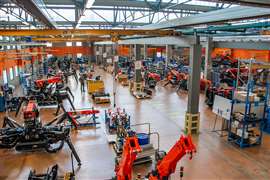5 disruptive geopolitical trends in manufacturing and how they can be overcome
29 April 2024
In mid-April, the European Commission hosted the Advanced Manufacturing Industry Conference in Brussels, Belgium. The event brought together diverse stakeholders, including policymakers, corporate executives and institutional representatives to discuss issues related to the European Union’s (EU) goal of becoming a net zero economy by 2050. Key agenda items included advanced manufacturing as it relates to a net zero future, data-driven manufacturing and embracing generative artificial intelligence (AI).
Bart Deckers, partner at EY in Belgium with expertise in strategy and advanced manufacturing, helped kick off the event with an assessment of manufacturing in Europe.
Global Manufacturing Challenges
“Over the past years, we have performed global research studies such as CEO outlook surveys with thousands of CEOs and financial investors,” he said. “Building on these insights and strategic outlook, we acknowledge that the European industrial landscape poses considerable complexities and challenges, as 98 percent of CEOs indicate that they are adapting to geopolitical challenges.”
 Italian crane maker Jekko runs a production line instead of cell-based manufacturing. (Photo: Jekko)
Italian crane maker Jekko runs a production line instead of cell-based manufacturing. (Photo: Jekko)
Deckers described five geopolitical trends that he said are disrupting manufacturing.
- Global Instability. According to Deckers, the current global situation is “characterized by shifting alliances and global elections.” Such instability across the globe “significantly impacts our resources and labor,” he said.
- The Growth of AI. As the ramifications of AI continue to unfold on a global scale, Deckers said the technology is something that manufacturers are struggling to make useful. “The collective endeavor to harness AI power has really begun reshaping manufacturing on a global scale,” he said, “with our CEO outlook indicating it is one of the highest priorities in the next 12 months to adopt AI and drive efficiencies.”
- Supply Chains. Deckers said reconfiguring supply chains is a priority for manufacturers “as the global pressure on supply resilience, the efforts to boost domestic competitiveness and trigger supply chain diversification are gaining momentum.” Within the EU, he noted this phenomenon has manifested in a shift towards nearshoring from Central and Eastern European countries.
- Securing Key Resources. Decker said it will be important for manufacturers to ensure consistent supplies of critical resources. The reasons for this include “the emerging competition for commodities, the battle against climate-driven resource scarcity and ever-fluctuating supply/demand dynamics,” he said, adding that “the EU’s escalating reliance on lithium, for example, for its green energy transition is a testament to this strength.”
- Climate Change. Addressing this phenomenon and the associated regulations intended to mitigate it remains a trend in manufacturing. According to Deckers, addressing climate change and sustainability presents opportunities for manufacturers to transform their operations, making them more valuable and competitive. “This is not only a compliance game,” he said. “Ninety-five percent of CEOs confirm they are planning to maintain the pace of transformation, or even accelerating it, within the next 12 months.”
Addressing Global Trends
Addressing these trends will require manufacturers to take a number of steps, Deckers said.
“Businesses must overhaul current models, strategically position themselves in evolving ecosystems and make smart technology choices to promote resource efficiency,” he said. “CEOs highlighted the impact of technology as the major force that will be reshaping the industry, making digital transformation more than ever a key priority on their strategic agendas.”
As for that strategy, Deckers said manufacturers should strive to make it future proof, which will require leveraging sustainability, innovation and technology.
“Advancing toward a net zero future is absolutely unavoidable, but also offers the potential for financial gains,” he said. “And we even see companies getting value, be it EBIT margin coming out of that, while embedding this into their products and services.”
Deckers said manufacturers are also mitigating challenges via data-driven innovation, such as agile production techniques and supply chain intelligence platforms to reduce inventory as well as cross-functional digital collaboration to mitigate maintenance costs. Such innovative thinking is also tangible on the plant floor in the form of transformative technologies such as AI and robotics, Deckers said.
All of this strategic transformation will require a workforce capable of leveraging and managing it.
“Investing in advanced technologies necessitates strong cybersecurity and continuous learning,” he said. “This equips the workforce with skills to handle these innovations and often results in higher paying jobs, promoting economic prosperity and valuable employee development in more technologically advanced manufacturing sectors.”
Policy Meets Industry
Deckers said that policymakers and industry must cooperate to drive transformation in advanced manufacturing.
“On the one hand, European companies are trying to transform to green products and technologies but still lack incentives and harmonization in the implementation of regulations to transform at the desired speed,” he said. “On the other hand, the EU is making all efforts to restore competitiveness and keeping the pace in Europe by incentivizing innovation and encouraging local production.”
Deckers added that the EU should support companies in their efforts by providing guidance, frameworks, incentives and regulations. Regarding AI in particular, he noted the importance of understanding the value it can bring to manufacturers as they work to embrace it.
“And I think with the combination of policymakers, institutions and industry leaders, there should be a path forward to do this together and to shake hands and make it happen so that we can stay ahead of the curve, because things are happening at very high speeds,” Deckers said.
CONNECT WITH THE TEAM







